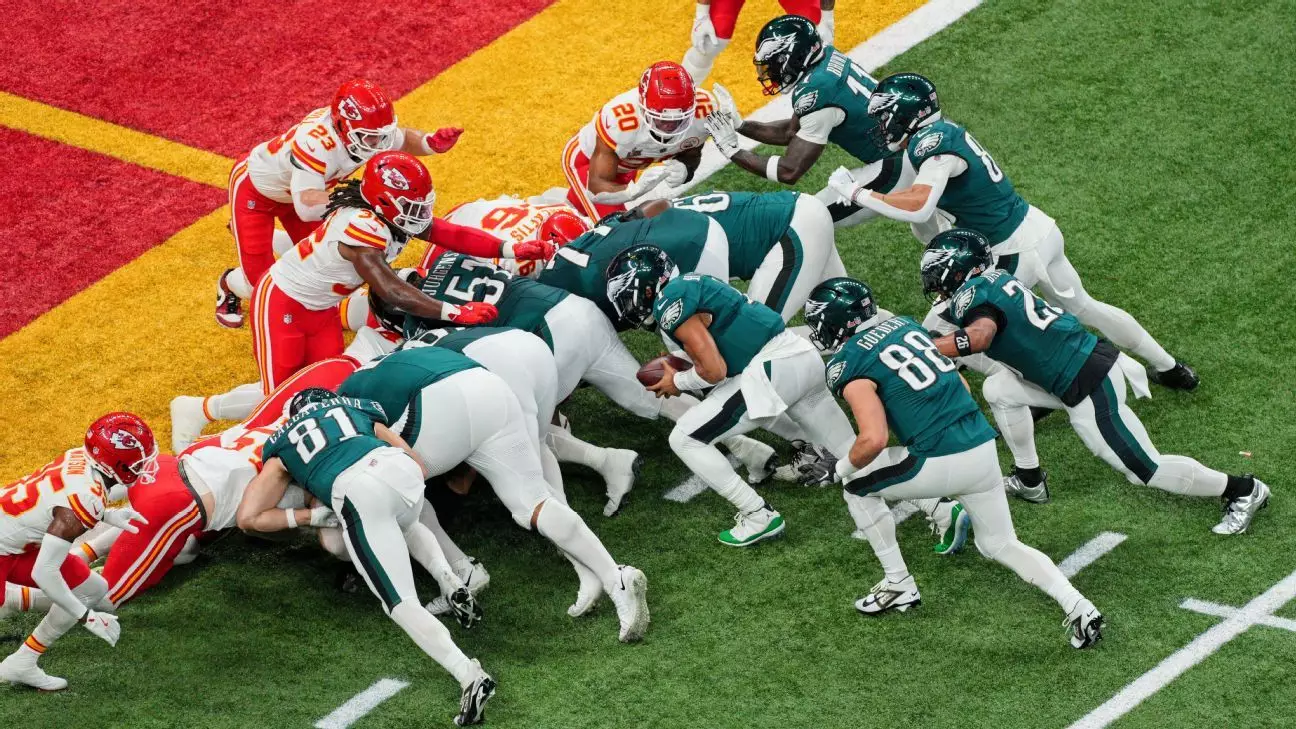The NFL landscape is continuously evolving, with teams constantly testing the limits of rules and strategy to gain a competitive edge. One particular play, the „tush push,“ has sparked considerable debate among football officials and teams alike. Recently, a rule proposal has been submitted with the aim of outlawing this controversial quarterback sneak maneuver, leading to discussions that could reshape the way the game is played.
At the heart of this controversy is a proposal made by an undisclosed NFL team, as revealed by Troy Vincent, the NFL’s executive vice president of football operations. As teams gather for the scouting combine, Vincent disclosed that the competition committee would review this proposal, which could see a vote from NFL owners in the coming months. For any rule change to take effect, at least 24 out of the 32 owners must endorse it—a challenging threshold that underscores the potential difficulty of enacting this change. This proposal serves as a reminder of the NFL’s ongoing struggle to balance innovations on the field with the need to maintain the integrity and safety of the game.
The „tush push“ has been widely associated with the success of teams like the Philadelphia Eagles and Buffalo Bills, who have capitalized on the strategy over the past three seasons. With a staggering 163 successful executions of the play—far outpacing the rest of the league—these teams have demonstrated its offensive potency. The coveted statistics reveal an impressive 87% success rate in achieving touchdowns or first downs through this maneuver, significantly higher than the league average. Such effectiveness makes it a focal point for discussions regarding fairness and competitive balance.
Proponents of the tush push argue that it is simply a manifestation of sound football strategy. Nick Sirianni, head coach of the Philadelphia Eagles, has been vocal in prioritizing the play’s continuation, emphasizing that the Eagles have excelled in its execution. Coaches and players alike view the play as a legitimate tactic—one that is difficult to defend against when performed effectively. Notably, Jalen Hurts, the Eagles quarterback, scored a pivotal touchdown in Super Bowl LIX employing this very strategy, cementing its place in the game’s history as a high-stakes play.
Whether it falls under the category of innovation or routine, the tush push has led to ever-expanding discussions surrounding player safety and the physical nature of football. Concerns about injuries have been raised, especially considering the defensive strategies attempting to counter it. This debate transcends athletic performance, placing emphasis on the long-term implications on player welfare, with high-profile incidents prompting officials to rethink the boundaries of permissible plays within the sport.
Historically, adaptations to NFL rules stem from both player safety considerations and the evolving dynamics of the game itself. Vincent drew comparisons between the tush push and other contentious plays, noting that similar discussions have arisen before. As conversations around the “hip-drop” tackle gathered momentum last year, the competition committee opted to focus on that specific issue while setting aside the tush push discussion. However, the immense success and prevalence of this play have led to its resurrection as a point of focus—a nod to the Play’s unique strategic implications and the potential ripple effects it could generate if allowed to flourish uninhibited.
In the wake of the proposal, the league is faced with the challenging task of deliberating the validity and future of such gamesmanship in football. The growing prevalence of the tush push emphasizes a broader trend toward effective but demanding play styles; the NFL must navigate these waters carefully to ensure it adapts while taking into account the longstanding traditions of the game.
As the impending vote approaches, it remains to be seen whether the NFL will modify the parameters around the tush push. While some owners may champion its discontinuation for concerns over safety and fairness, others may see it as a viable extension of game strategy. This moment represents a crucial crossroads for the league, and the implications of the decision will resonate far beyond the confines of the field—impacting teams, players, and fans alike in the years to come. Regardless of the outcome, discussions regarding the tush push have opened up a broader dialogue on how the NFL must evolve while honoring the essence of the game.


Napsat komentář